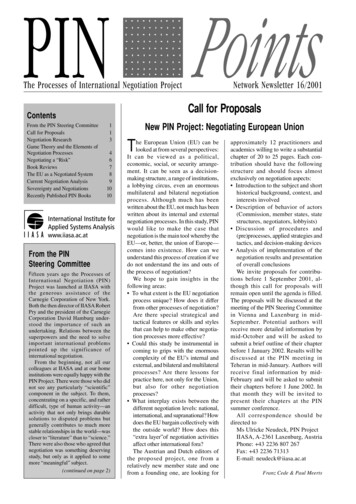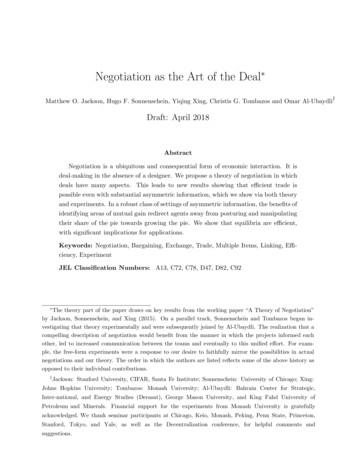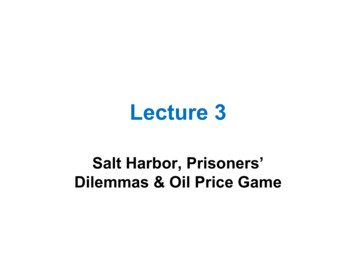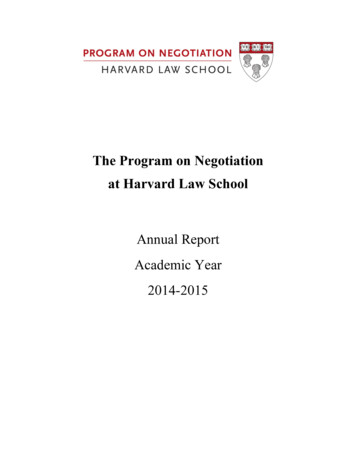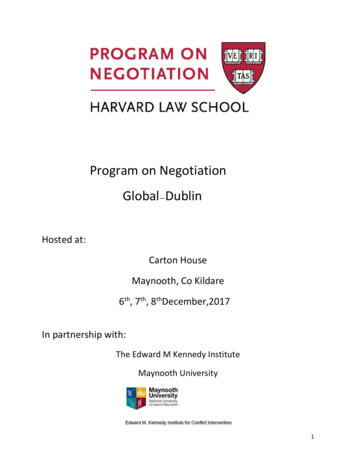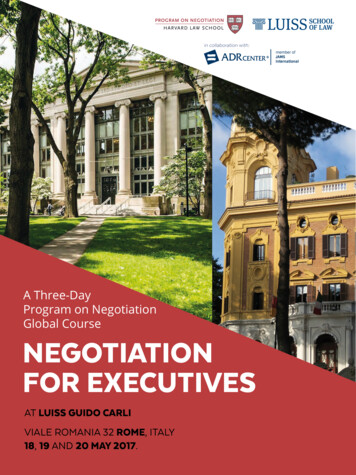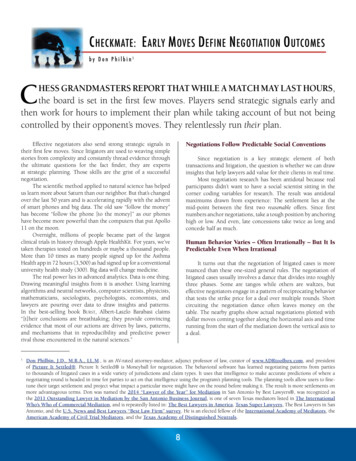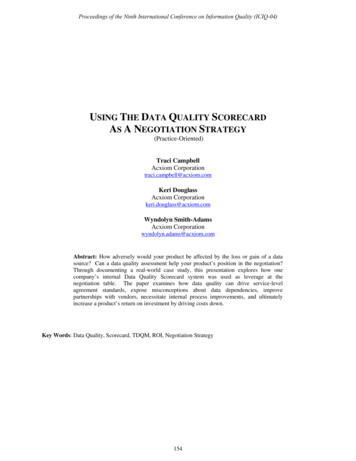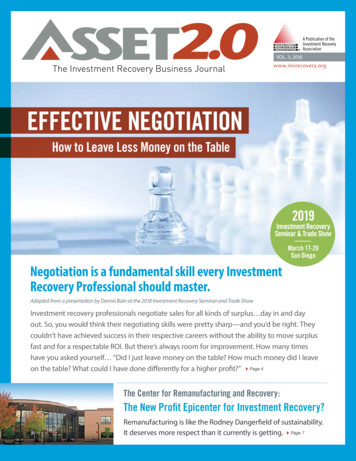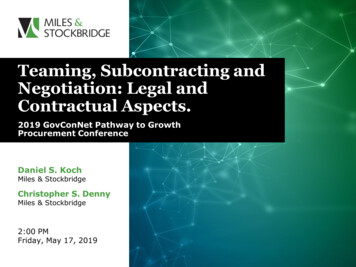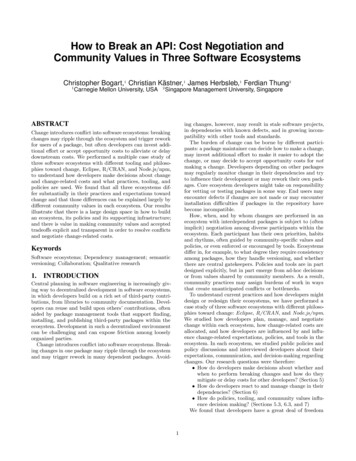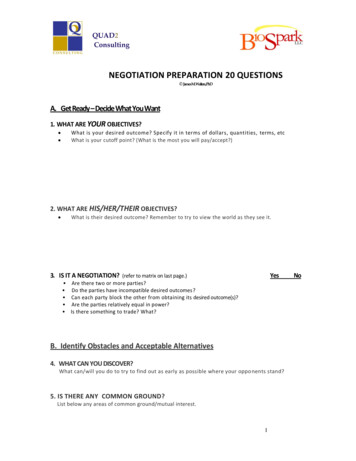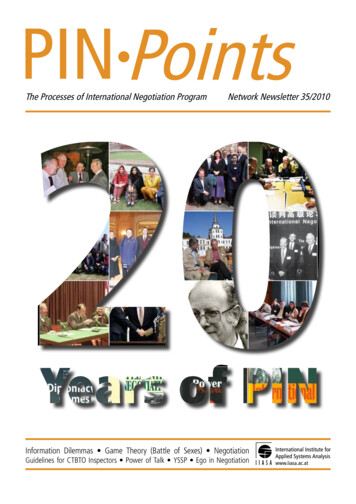
Transcription
PIN PointsThe Processes of International Negotiation ProgramNetwork Newsletter 35/2010Information Dilemmas Game Theory (Battle of Sexes) NegotiationGuidelines for CTBTO Inspectors Power of Talk YSSP Ego in Negotiation
2PINPointsFrom the PIN Steering CommitteeEditorialAs with all transitions, there is a sense of loss with the partingof PIN from IIASA – PIN’s home for over 20 years. Guy OlivierFaure’s brief history of PIN under IIASA’s auspices reflects just howfruitful the relationship was – the development of a network of4,500 researchers and contributors, the biennial Roadshows on topical negotiation issues, the publication of PINPoints, and, of course,the publication of 20 books on a wide range of negotiation issuesand topics. PIN and IIASA will now follow different developmentaltrajectories, and as we move to our new home at Clingendael wewill continue our collaboration with the CTBTO and begin workingon an array of new projects. If our aim is to prevent violent meansof exchange, negotiation will continue to play an essential role indealing with the major issues the world faces today: climate change,international financial regulation, eradication of poverty, the nuclear threat, terrorism, as well as ethnic violence and genocide. Themanagement process will be key to the outcome of contests overcontent.The scope of PIN’s work is reflected in the contributions to thisedition of PINPoints: the knowledge acquired by graduate studentsin IIASA’s Young Scientists Summer Program, the collaboration withthe CTBTO, new publications by several PIN members, and certainchallenges related to process management in the field.Our new projects reflect on current developments. The globaleconomy has undergone some seismic shifts. A meltdown in Western economies has triggered a review of financial regulations – andprotest action in the streets of Greece, France, Spain, and othercountries. Sadly, albeit almost inevitably, symptoms of political intolerance and xenophobia have appeared, as economic pressuresincrease. These, as much as the economic meltdown, threaten values of tolerance and human rights in nations that have long espoused them.Our first project focuses on meltdowns and breakdowns. It addresses the dynamics of meltdown in traditional regimes underrapidly changing conditions, as well as the breakdowns in negotiations intended to bring about system redesign as power dynamicschange. The second project considers reconciliation as a form ofpreventive negotiation. It is in times of scarcity that ethnic tensionsresurface. If a return to the wars of the past is to be prevented, thenreconciliation must also find resonance in the worst of times, notonly in the best of times. Postwar Europe has stood as a beacon ofreconciliation through a long period of sustained economic growth.Now it must pass the economic stress test.Communication is key to effective negotiation – more specifically, the extent and timing of information exchanges. Informationexchanges, however, do not only bring opportunity, they also bearrisk. As Rudolf Schüssler asserts, even as we seek more integrativemodes of communication, we give insufficient attention to problems related to information exchange. He refers to three types ofinformation dilemma in negotiations: The prisoner’s dilemma, thechicken, and the stag hunt game scenarios. Schüssler argues thatinformation dilemmas are as prevalent in integrative bargaining asthey are in distributive approaches. Win-win negotiation does notPINPoints 35/2010Mark Anstey, Rudolf Avenhaus, Guy Olivier Faure,Fen Osler Hampson, Ariel Macaspac Penetrante, Paul Meerts,Mordechai Melamud, Valerie Rosoux, Rudolf Schüssler,Gunnar Sjöstedt, Mikhail Troitskiy, I. William Zartmansimply happen. Bargaining partners have to first build trust and develop a foundation of shared information before they can resolvecontentious issues. As they begin to share information to resolvethe problem, opportunities for exploitation – and thus risk – arise.Integrative negotiators have to deal with dilemmas of informationexchange no less than advocates of a distributive approach. By explaining how the battle of the sexes paradigm became a dominantfeature in his work, Rudolf Avenhaus offers some humorous butperceptive insights into how his years of work with PIN have taughthim how to apply modeling in negotiation.Some of these dilemmas, which are reviewed here by MordechaiMelamud, were clearly observable during the CTBTO workshop heldat the Vienna International Centre in June 2010. In an inspectionrole-play, the parties, on the one hand, faced the dilemma of trustbuilding and openness and the legitimate non-disclosure of specific information, on the other. The limitations to disclosure and thescope of the inspection are determined by negotiation. Both theinspection team and the nation being inspected desire credibilityin the eyes of the international community. They face the challengeof jointly mapping a safe passage through the minefields of mutualsuspicion, flawed information, and international scrutiny.Hampson and Zartman present a summary of their new bookThe Global Power of Talk - The Uses of Negotiation to AdvanceGlobal Security. The significance of understanding and applying themany ways parties “talk” to one another is reflected in the summaryof their work included here.Continued on page 4www.iiasa.ac.at/Research/PIN
3PINPointsContents44PIN is Over 20 Years OldA brief synopsis of the history of the Processes of International Negotiation Program9Information Dilemmas in International NegotiationTaking account of the strategic aspect of information exchange in integrativebargaining12 The Modeler’s ExperienceThe battle of the sexes14 Workshop on the Development of Negotiation Guidelinesfor CTBTO Inspectors and the PIN book on CTBT negotiations18 PIN Meetings in Durham and LvivNegotiation and legitimacyBridging policy and research19 The Global Power of TalkThe uses of negotiation to advance global security91222 Summary of YSSP ResearchToward an agreement on climate; Explaining the impasse in fissban negotiations;and Knowledge and policy making in negotiations26 Young Scientists’ IIASA ExperienceKatrina Running, Aviv Melamud, and Igor Istomin and their summer of 201028 Egotiation19Ego as a factor in international negotiation processes30 To Block the Slippery RoadNew book on reducing identity conflicts and preventing genocide31 The Vienna Negotiation DayBidding Auf Wiedersehen22www.iiasa.ac.at/Research/PINPINPoints 35/2010
4PINPointsFrom the PIN Steering Committee(continued)Three students from different fields recently completed IIASA’s Young ScientistsSummer Program and offer their viewsand conclusions on a number of interesting topics that reflect their studies. Duringher time at IIASA, Katrina Running investigated attitudinal change toward environmental issues in developed, developing,and transitional economies. Aviv Melamudexamined the impasse on fissban, the international treaty banning the production offissile material for weapons purposes. IgorIstomin explored the need for and implications of scientific knowledge and expertisein international negotiations across a widerange of issues, but also the complexitiesassociated with the use of scientific data –an area in which territorial struggles are noless prevalent and in which the search fortruth involves contests over data and overthe way it is gathered and interpreted.Paul Meerts looks at the role of egoin negotiation – and challenges PINPointsreaders to comment. He suggests that egocan have positive implications for negotiation, for instance, by motivating leaders toassume responsibility to reach deals whereothers would not. However, threats toego are a central problem in negotiation,entrenching hard (and often irrational) positional bargaining, perhaps even more soin certain cultural settings. He considersapproaches to dilute this impact by bureaucratizing negotiation processes and fostering personal relationships. And to makematters even more complex, he raises thepoint that ego may not only be somethingindividuals possess, but nations as well – acollective ego!Currently, an intensification of politicaland social stresses at the global level isevident – the importance of understanding the dynamics of negotiation will thusonly increase for politicians, diplomats, andothers tasked at various levels to resolvethe international tensions that emerge inresponse to the economic crisis and theongoing problems in establishing a regimefor global trade, the eradication of poverty, climate change, and the containmentof weapons of mass destruction. In otherwords, we are bringing along a great dealof work with us to Clingendael!The PIN Steering CommitteePINPoints 35/2010PIN is Over 20 Years OldPIN’s history has developed around negotiation concepts, an approach thatcould be quite relevant scientifically, because all collective endeavors are basedon negotiation – in fact, our own life as agroup has been an ongoing negotiation.We could summarize our existence as beinga single event that successfully transformedinto a regime, which is far from always thecase in international agreements. In thebeginning, we faced a number of obstacleswhich should have actually made the completion of any project unfeasible. However,we did not know at the time that it mightnot be possible, so we went ahead. Thefirst obstacle we encountered was culturaldifferences, which in our case included nofewer than five different cultures. The second obstacle was the range of disciplinesrepresented in our group, with no fewerthan seven disciplines struggling to finda common language. The third obstaclewas not about us, but about what it waswe wanted to do: joint research, appliedresearch, consulting, training, or networkbuilding. Through pragmatic initiatives,we finally managed to develop not just acommon language, but shared perspectivesand joint values as well.Our activities can be described as a jointadventure under conditions of uncertaintyand complexity. No need to mention thatour common story as a process, resulting ina number of outcomes which demonstratedthat we were actually playing a positivesum game, could fill a book. Under thesecircumstances, we continued working onresearch projects and publishing bookson uncharted topics. We also turned intoapostles of good news, namely, conflictresolution by peaceful means. We developed a network of several thousand scholars and practitioners, supervised nearly oneentire generation of post-doctoral studentsand, finally, intervened as mediators onsome thorny issues. Our group had a life ofits own, with some of us leaving to enjoywell-deserved rest and others departingfrom this world to go to another one, whichis said to be better. New people joined us,yet one quite unique aspect has remainedin all these years: the absence of a distinctleader, director, chairperson or whateverother label is used. We realized that all ofus were directors, a fine way of acquiring ahigh-level position and, at the same time,Howard Raiffa (IIASA’s first director, 1973 –1975) introduced international negotiationsinto IIASA’s research agenda.ensuring that our democracy worked. Themost extraordinary thing in all of this is ourresearch topic, international negotiation: anew perspective (process), an increasinglycharacteristic activity, and a continual cornucopia of new approaches to pursue. Thedetails of our very special journey followbelow.The PIN ProjectThe PIN Program (Processes of International Negotiation), like many other projects, started with an encounter of peopleof good will, who were all looking in thesame direction to make this world a betterplace to live in. Thus, with the blessing ofThe first issue of PINPoints was published in1991 and included a contribution by H. Raiffa.www.iiasa.ac.at/Research/PIN
5PINPointsOne of the first Roadshows in October 2000 at the Guanghua School ofManagement, Beijing. Left to right: Rudolf Avenhaus, Guy Olivier Faure,I. William Zartman, Paul Meerts, Franz Cede, Victor A. Kremenyuk,Gunnar Sjöstedt.Howard Raiffa, Director of IIASA, they came together to establish areal task force. Winfried Lang, Austrian Foreign Ministry; Jeff Rubin,Harvard University; I. William Zartman, Johns Hopkins University;Victor Kremenyuk and A. Zotov, Soviet Academy of Sciences; Gunnar Sjöstedt, Swedish Institute of Foreign Affairs; Wilfried Siebe,University of Bielefeld, and Guy Olivier Faure, Sorbonne University,formed the PIN Steering Committee (SC).Most of these “founding fathers” were from different countries,came from different disciplines and from different institutions, yetthey converged around the same concerns. They turned their differences into advantages, gradually building up a unique model of organization, which, remarkably, has been effective for over 20 years.PIN’s ultimate goal is to contribute to the theory and practiceof international negotiation and conflict resolution. The means toachieve this objective is an organization which consists of benevolent equals, who have no leader and no hierarchical structure, steering a network of 4,500 researchers and practitioners. The PIN Program promotes improved understanding and practices of processesof international negotiation through publications, conferences, consultations, networks, and outreach.With regard to the research field, the objective is to deepenknowledge on a number of issues and themes relating to international negotiation that are characterized by significant gaps, suchas power, multilateral negotiations, cultural differences, peace vs.justice, preventive negotiation, formal models, and escalation, toname a few. In terms of concrete issues, PIN has researched environmental negotiations, economics, the European Union, terrorism,nuclear issues, and climate change.PIN has elaborated a unique and prolific analytical frameworkto organize research on negotiation theory and practice based onfive analytical categories intended
of exchange, negotiation will continue to play an essential role in dealing with the major issues the world faces today: climate change, international financial regulation, eradication of poverty, the nucle-ar threat, terrorism, as well as ethnic violence and genocide. The management process will be key to the outcome of contests over content.
